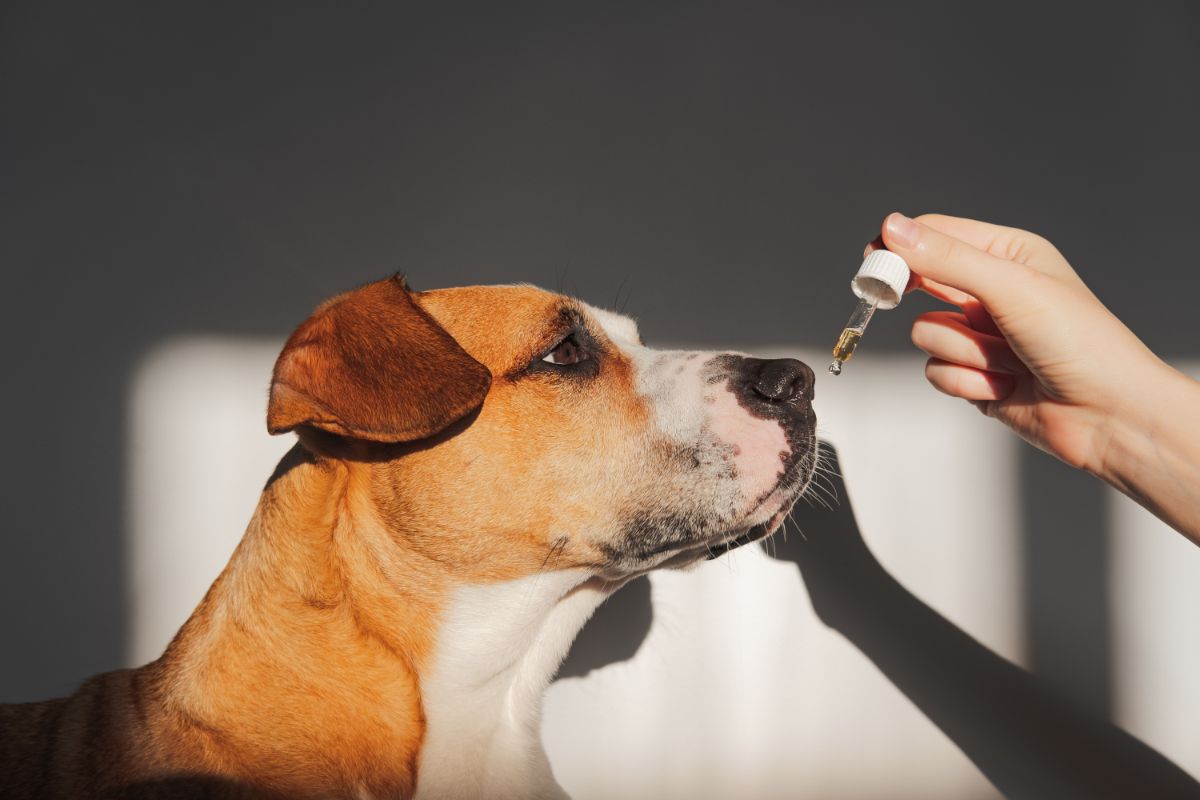Iberogast For Dogs: Uses, Dosage & Expert Advice Guide
Ever wondered if that herbal remedy sitting in your medicine cabinet could also bring relief to your furry friend? The answer might surprise you: Iberogast, a well-known digestive aid for humans, is increasingly being recognized for its potential benefits in treating canine digestive issues. But before you reach for the bottle, let's delve into the world of Iberogast for dogs, exploring its uses, dosages, and potential side effects.
The question of whether human medications can be safely administered to pets is a common one among concerned pet owners. While it's crucial to consult with a veterinarian before giving any medication to your dog, some human drugs, under careful guidance, can be used to treat certain conditions. Among these is Iberogast, a herbal remedy primarily used for digestive ailments in humans. But what exactly is Iberogast, and how can it potentially help your canine companion?
Iberogast is a liquid medication comprised of a unique combination of nine different herbal extracts. These include Iberis amara (bitter candytuft), chamomile, milk thistle, and several other botanicals traditionally used to soothe and regulate the digestive system. In humans, Iberogast is frequently used to alleviate symptoms of irritable bowel syndrome (IBS), functional dyspepsia (upset stomach), and other digestive disturbances like bloating, cramping, and nausea. Its mechanism of action is multifaceted, working to reduce inflammation, regulate stomach motility, and protect the gastrointestinal lining.
- Unveiling The Extraordinary Journey Of Lynette Zang A Biography Filled With Surprises
- Unveiling The Dimensions Of Jill Vedders Age Discoveries And Insights
The use of Iberogast in veterinary medicine is gaining traction, particularly among holistic veterinarians and pet owners seeking natural alternatives for digestive support. While research specific to dogs is still limited, anecdotal evidence and the understanding of the drug's mechanism suggest potential benefits for various canine digestive issues. These include cases of diarrhea, vomiting, bloating, abdominal pain, and even conditions like inflammatory bowel disease (IBD). Iberogast's ability to soothe the gut, reduce inflammation, and regulate motility makes it a potentially valuable tool in managing these conditions.
However, it's absolutely essential to approach the use of Iberogast for dogs with caution and under the guidance of a qualified veterinarian. Dosage is a critical factor, as the appropriate amount varies depending on the dog's size, breed, and the severity of their condition. As a general guideline, some veterinarians recommend administering between 5 and 20 drops of Iberogast, up to three times daily. But this is merely a starting point, and your veterinarian may adjust the dosage based on your dog's individual needs and response to the medication.
| Iberogast for Dogs: Key Information | |
|---|---|
| What is it? | Herbal remedy for digestive issues |
| Main Ingredients: | Iberis amara, chamomile, milk thistle, etc. |
| Potential Benefits: | Relieves diarrhea, vomiting, bloating, abdominal pain |
| Dosage: | 5-20 drops, up to three times daily (Consult vet) |
| Administration: | Oral |
| Important Note: | Consult vet before use |
| Reference: | Iberogast Official Website |
It's equally important to be aware of potential side effects and contraindications. While Iberogast is generally considered safe, some dogs may experience adverse reactions such as mild gastrointestinal upset or allergic reactions. Dogs with known allergies to any of the herbal ingredients in Iberogast should not be given the medication. Furthermore, Iberogast contains a small amount of alcohol, which, although typically harmless in the recommended dosage, could be a concern for dogs with certain health conditions or sensitivities.
- Unveiling Diletta Leotta Discoveries And Insights From Wikipedia
- Unveiling Honor Blackman A Journey Of Discovery And Inspiration
The presence of alcohol is a noteworthy consideration, as even small amounts can be problematic for some animals. While the quantity in a typical dose of Iberogast is low, it's still vital to consult your veterinarian, particularly if your dog has liver issues, kidney problems, or is pregnant or lactating. Opting for alcohol-free alternatives, if available and deemed suitable by your vet, is a prudent approach in such cases.
It's crucial to distinguish between acute and chronic digestive issues when considering Iberogast for your dog. For occasional bouts of diarrhea or vomiting, Iberogast may provide temporary relief. However, if your dog experiences frequent or persistent digestive problems, it's essential to seek veterinary attention to identify the underlying cause. Chronic vomiting and diarrhea can be signs of more serious conditions like IBD, pancreatitis, or even cancer, which require specific treatment strategies.
In addition to its potential use in treating digestive issues, Iberogast is sometimes suggested to help with related problems. For example, some pet owners report that Iberogast can alleviate excessive gas and bloating in their dogs, leading to increased comfort and reduced flatulence. Similarly, the herbal remedy is thought to have a soothing effect on the stomach lining, potentially reducing the likelihood of acid reflux or heartburn in susceptible dogs.
However, it's critical to emphasize that Iberogast is not a substitute for proper veterinary care. If your dog is exhibiting symptoms of digestive distress, such as loss of appetite, lethargy, or blood in their stool, it's imperative to consult a veterinarian promptly. These signs could indicate a serious underlying condition that requires immediate medical intervention. Relying solely on Iberogast without addressing the root cause could delay diagnosis and treatment, potentially jeopardizing your dog's health.
When administering Iberogast to your dog, it's essential to do so correctly to ensure its effectiveness and minimize the risk of side effects. The liquid medication can be given directly into the dog's mouth using a dropper or syringe. Alternatively, you can mix Iberogast with a small amount of food or water, making it more palatable for your pet. Observe your dog closely after administering Iberogast to monitor for any adverse reactions.
The question of whether Iberogast is safe for other pets, such as cats, is another common concern among pet owners. While the herbal remedy is primarily marketed for humans and dogs, some veterinarians may consider its use in cats under specific circumstances. However, it's essential to recognize that cats have unique physiological characteristics, and certain medications that are safe for dogs may be toxic to cats. Always consult with a veterinarian before giving Iberogast or any other medication to your cat.
The decision to use Iberogast for your dog should be made in consultation with a trusted veterinarian who is familiar with your pet's medical history. Your veterinarian can assess your dog's condition, determine if Iberogast is appropriate, and provide specific dosage instructions. They can also monitor your dog's response to the medication and adjust the treatment plan as needed. Never self-diagnose or self-treat your dog, as this could have serious consequences.
It's also important to remember that Iberogast is not a "one-size-fits-all" solution for canine digestive issues. While it may be helpful for some dogs, it may not be effective for others. Factors such as the underlying cause of the digestive problem, the dog's overall health, and individual sensitivities can all influence the outcome. If Iberogast does not provide the desired relief, your veterinarian may recommend alternative treatments or diagnostic tests.
In addition to Iberogast, there are several other natural remedies and dietary modifications that may help support your dog's digestive health. Probiotics, for example, are beneficial bacteria that can help restore balance to the gut microbiome. Fiber-rich foods, such as pumpkin and sweet potato, can promote regular bowel movements. And a bland diet, consisting of boiled chicken and rice, can help soothe an upset stomach. Always consult with your veterinarian before making significant changes to your dog's diet or adding new supplements.
While Iberogast can be a helpful tool in managing certain canine digestive issues, it's essential to use it responsibly and under the guidance of a veterinarian. Remember that Iberogast is not a substitute for proper veterinary care and should not be used to self-treat serious medical conditions. By working closely with your veterinarian and understanding the potential benefits and risks of Iberogast, you can make informed decisions about your dog's digestive health.
Beyond Iberogast, it's worth noting some common questions and concerns pet owners have regarding their dog's digestive health. One frequent query is about the appropriate dosage of medications like Pantozol or Maaloxan for dogs. These are human medications used to reduce stomach acid, and while they might be considered in certain veterinary cases, the dosage is highly specific and depends on the dog's weight and condition. Never administer these medications without explicit instructions from your vet, as incorrect dosages can be harmful.
Another common scenario involves a dog exhibiting symptoms like loud smacking, excessive salivation, a constant urge to eat grass, restlessness, coughing, and noisy breathing. These signs could indicate a range of issues, from simple indigestion to more serious problems like acid reflux, esophageal disorders, or even heart conditions. A thorough veterinary examination is necessary to determine the underlying cause and appropriate treatment plan.
The case of a dog named Goldie, a nine-year-old with the aforementioned symptoms, highlights the complexity of diagnosing digestive issues. Goldie's vet would likely conduct a physical exam, run blood tests, and possibly perform imaging studies like X-rays or ultrasound to assess her digestive tract and rule out any underlying medical conditions. Based on the findings, the vet might recommend dietary changes, medications, or other therapies to address Goldie's specific needs.
The anecdote about "Luzy" running amok and then suddenly becoming lethargic also raises important considerations. While it's tempting to attribute such behavior to simple hyperactivity followed by exhaustion, it could also signal underlying pain or discomfort. If Luzy is normally active and playful, a sudden shift to lethargy warrants a veterinary visit to rule out any medical causes, such as arthritis, muscle strain, or internal injuries.
The pet owner's frustration with finding information about Rimadyl for dogs and its unsuitability for cats underscores the importance of accurate and reliable information. While online resources can be helpful, it's crucial to verify the information with a trusted veterinarian. Many medications have different effects in dogs and cats, and what's safe for one species can be dangerous for another. Always prioritize veterinary advice over information found online.
The distinction between vomiting and diarrhea is also important. While both are signs of digestive upset, they can have different causes. Vomiting is often triggered by irritation of the stomach or upper small intestine, while diarrhea usually indicates a problem in the large intestine. Some conditions, like pancreatitis or colitis, can cause both vomiting and diarrhea.
The text emphasizes that inflammation of the pancreas or colon can lead to both diarrhea and vomiting. This highlights the importance of considering the entire digestive system when evaluating a dog with digestive problems. A veterinarian will typically assess the dog's entire medical history, perform a thorough physical exam, and run appropriate diagnostic tests to pinpoint the source of the problem.
The recommendation to use Iberogast Classic for occasional digestive issues suggests that there are different formulations of Iberogast available. Iberogast Advance, for example, is marketed as a more potent formulation with a higher concentration of soothing, anti-inflammatory, and mucosa-protecting extracts. The choice between Iberogast Classic and Advance depends on the frequency and severity of the digestive symptoms.
The reminder to follow the instructions in the package insert is crucial for safe and effective medication use. Package inserts provide important information about dosage, administration, potential side effects, and contraindications. Always read the package insert carefully before giving any medication to your dog, and consult with your veterinarian if you have any questions or concerns.
The statement that most dogs can be trained to take medication through positive reinforcement is an encouraging message for pet owners struggling to medicate their dogs. Positive reinforcement techniques, such as rewarding the dog with treats or praise for taking the medication, can make the process less stressful for both the dog and the owner. Avoid punishing or forcing the dog to take medication, as this can create negative associations and make future attempts even more difficult.
The reminder that Iberogast should not be used after its expiration date is a basic but important safety precaution. Expired medications may lose their effectiveness or even become harmful. Always check the expiration date before giving any medication to your dog, and dispose of expired medications properly.
The instruction to keep medications out of reach of children is a standard safety warning for all medications. Children may accidentally ingest medications or misuse them in other ways. Store medications in a secure location where children cannot access them.
The statement that Iberogast contains less than 0.1 bread units per 20 drops is relevant for diabetic dogs. Bread units are a measure of carbohydrate content, and diabetic dogs require careful monitoring of their carbohydrate intake. While the carbohydrate content of Iberogast is low, it's still important to consider it when managing a diabetic dog's diet.
The effectiveness of Iberogast in treating heartburn and indigestion has been demonstrated in clinical studies. This provides further support for its use as a digestive aid in both humans and potentially dogs. However, it's important to note that clinical studies in dogs are still limited, and more research is needed to fully understand the effects of Iberogast on canine digestive health.
In conclusion, the use of Iberogast in dogs is an area of growing interest, but it's crucial to approach it with caution and under the guidance of a veterinarian. While Iberogast may offer potential benefits for certain canine digestive issues, it's not a substitute for proper veterinary care and should not be used to self-treat serious medical conditions. By working closely with your veterinarian and understanding the potential benefits and risks of Iberogast, you can make informed decisions about your dog's digestive health.
- Unveiling The Billionaire Behind The Pepsi Empire Net Worth Revealed
- Unveiling Jayson Tatums Beliefs A Journey Into Faith And Spirituality

Iberogast für Hunde Dosierung, Nebenwirkung & Anwendung

Iberogast Für Hunde Bauchschmerzen Wieviel Tropfen? TiereWissen

Der ultimative Leitfaden für die Verwendung von Iberogast bei Hunden